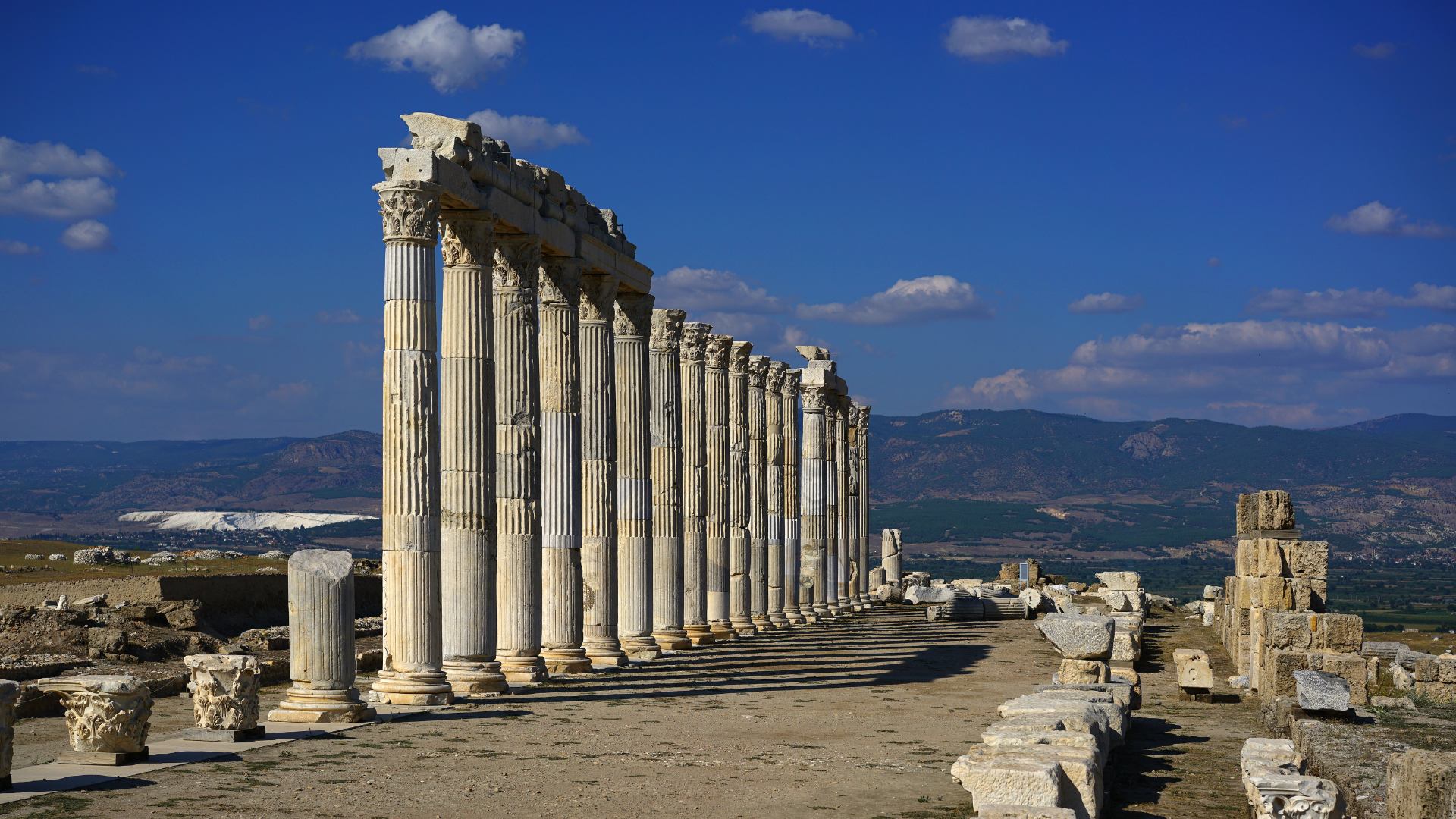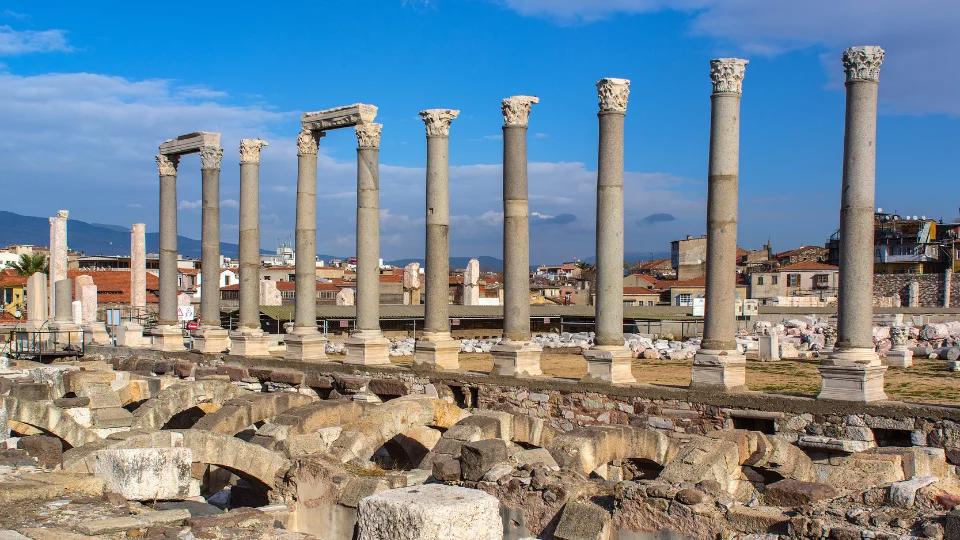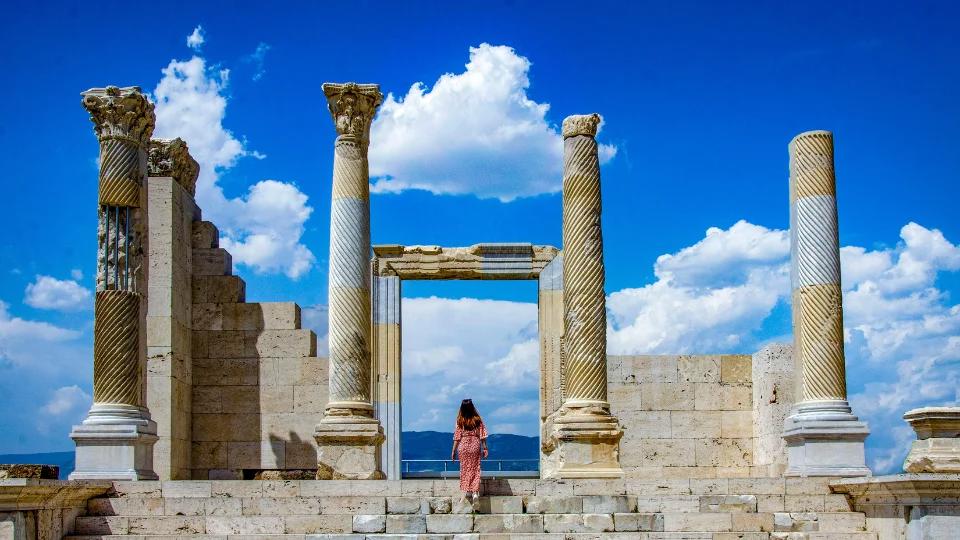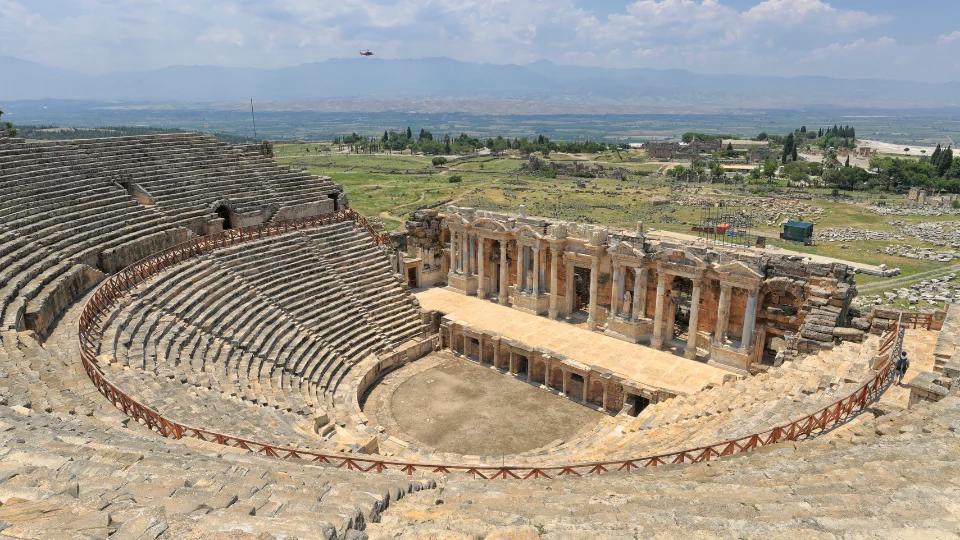
Sacred Sites of Turkey: A Biblical Journey
Turkey holds some of the most meaningful Christian sites outside of the Holy Land. The Seven Churches of Revelation—Smyrna, Pergamon, Thyatira, Sardis, Philadelphia, Laodicea and Ephesus—are all located in western Turkey. Along with them, places like Hierapolis, where Philip was martyred, and Colossae, mentioned in Paul’s letters, give deep context to the New Testament.

What are the key biblical sites in Turkey?
Smyrna (Izmir)
Ancient Smyrna, today’s Izmir, is one of the Seven Churches of Revelation. In the Bible, it is commended for remaining faithful despite suffering and persecution. It was a vibrant Roman city with a strong early Christian presence. During the tour, you’ll visit the Church of St. Polycarp, dedicated to one of the earliest Christian martyrs. You'll also walk through the ruins of the Agora of Smyrna, where daily life once unfolded beneath Roman colonnades. The city’s spiritual and historical energy makes it a meaningful first stop on your journey.
Pergamon (Bergama)
The city of Pergamon, located in modern-day Bergama, was a center of culture, learning, and religion in the Roman world. Mentioned in Revelation as the place "where Satan lives," it was home to many pagan temples and imperial cults. As part of the tour, you’ll explore the Acropolis, with its steep theater and remains of the Temple of Trajan. The Asclepion, an ancient healing center dedicated to the god of medicine, shows how faith and health were deeply connected. Pergamon is both visually stunning and spiritually profound.
Thyatira
Though smaller in archaeological remains, Thyatira holds an important place among the Seven Churches. It was known for its trade guilds, especially purple dye, and had a Christian community mentioned in Revelation. The church was praised for love, service, and perseverance, but also warned about false prophets. Today, visitors can see modest ruins, including parts of a basilica, columns, and fragments of the old city. It offers a quiet, reflective atmosphere, ideal for contemplating the early church’s challenges.

Sardis
Sardis was once the wealthy capital of the Lydian Empire and a symbol of luxury. But in Revelation, it was described as a church with a reputation for being alive, though spiritually dead. The city’s ruins include a massive gymnasium complex, ancient synagogue, and the remains of a Byzantine-era church, all standing side by side. These reflect a once-diverse community and provide a dramatic backdrop for understanding the spiritual lessons tied to Sardis.
Philadelphia
Among the Seven Churches, Philadelphia is one of only two that received no criticism in Revelation. It was praised for its faithfulness and endurance despite its small size. While the ruins here are limited, visitors can see parts of the Byzantine-era walls, columns, and church structures. The emotional weight of this stop comes from its message of open doors and eternal rewards—an inspiring reminder of steadfast belief.
Laodicea
Referred to in Revelation as the “lukewarm church,” Laodicea was known for its wealth, medical school, and textile industry. The city was criticized for spiritual indifference, yet its ruins today speak of a powerful past. You’ll visit the remains of two large churches, a Roman theater, and a stadium. Its impressive size and setting between two valleys provide a striking visual metaphor for its biblical message—neither hot nor cold.

Ephesus
One of the most famous cities in the Bible, Ephesus was a major Christian center where St. Paul preached for three years. It’s also believed that the Virgin Mary spent her final years nearby. The city offers some of the best-preserved ruins in the world: the stunning Library of Celsus, the enormous Great Theater, and the Marble Road. On the tour, you’ll also visit the House of the Virgin Mary, the Basilica of St. John, and the Temple of Artemis, one of the Seven Wonders of the Ancient World. Ephesus brings Scripture to life like few places can.
Hierapolis (Pamukkale)
Located near the white travertine terraces of Pamukkale, ancient Hierapolis is where Apostle Philip was martyred. The city was famous for its healing hot springs, often seen as a symbol of physical and spiritual restoration. Walk through the necropolis, one of the largest ancient cemeteries in Asia Minor, and visit Philip’s martyrium, a sacred site for Christian pilgrims. The combination of natural beauty and religious history makes Hierapolis a highlight of the tour.
Colossae
Though still largely unexcavated, Colossae holds deep biblical significance. It is the city addressed in Paul’s Letter to the Colossians, where he emphasized Christ’s supremacy and the unity of believers. Located in the Lycus River Valley near Laodicea, Colossae is a peaceful, untouched site with scenic views and quiet surroundings. Its role in early Christianity adds a reflective end to your tour, perfect for personal contemplation.
Whether you're a pilgrim, a history lover, or a curious traveler, this Biblical tour brings ancient scriptures to life. Walk through the ruins mentioned in the Book of Revelation and gain deeper insight with every step you take.

What is the itinerary of the 5-day Biblical Private Turkey Tour?
Day 1: Istanbul / Izmir / Pergamon
Fly from Istanbul to Izmir. Visit Smyrna’s Church of St. Polycarp and ancient Agora. Continue to Pergamon to explore its hilltop ruins, including the Acropolis and Asclepion.
Day 2: Pergamon / Thyatira / Sardis / Philadelphia / Pamukkale
Drive through key Revelation cities: Thyatira, Sardis, and Philadelphia. Discover early church ruins and rich biblical history.
Day 3: Hierapolis / Laodicea / Colossae / Kusadasi
Visit Hierapolis and Apostle Philip’s tomb. Continue to Laodicea and Colossae, both tied to Paul’s letters.
Day 4: Full Day in Ephesus
Explore Ephesus: Library of Celsus, Great Theater, House of Virgin Mary, and Basilica of St. John. Fly back to Istanbul in the evening.
Day 5: Departure from Istanbul
Transfer to the airport. Optional visit to Christian sites in the city if time allows.
Every stop on this tour—from Ephesus to Hierapolis—has been carefully selected for its deep spiritual and historical value. Book your Biblical Private Turkey Tour today and unlock the stories behind the Bible’s most powerful locations.

Frequently Asked Questions
How long should I stay at each site?
Plan at least one full day for Ephesus, Cappadocia and Antakya. Smaller churches can be seen in half a day.
Can I visit in winter?
Yes. Most sites are open year-round but some remote areas may be harder to reach.
Are these guided tours safe and easy to follow?
Yes. Trusted tour companies organize everything from transport to hotels.
Is the tour customizable?
Yes. We can adjust the itinerary based on your arrival date, interests, or spiritual needs. Cappadocia or Mount Ararat extensions are available.
When is the best time to visit?
April to June and September to November are ideal. The weather is pleasant and crowds are smaller.
Is this tour suitable for all ages?
Yes. It is paced to include rest, scenic drives, and informative stops. Modest walking is required at historical sites.
Why should I take this tour?
This tour helps you understand the early spread of Christianity in Asia Minor, follow in St. Paul’s footsteps, and see the Seven Churches of Revelation mentioned in the Bible — all with a knowledgeable guide who brings scripture to life.

Ready to explore the Seven Churches of Revelation?
Step into the pages of the New Testament and see where the early church once thrived. This journey will inspire, educate, and connect you to the spiritual roots of Christianity. Join our 5-day Biblical Private Turkey Tour to visit the Seven Churches of Revelation with expert guidance and total comfort. This all-inclusive private tour is the perfect way to walk in the footsteps of Paul, John, and the early Christian church. Contact us here and we’ll help you plan every step of the way.